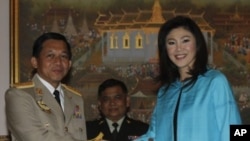Burma’s new government is winning cheers from environmental activists for halting large-scale power plants following public criticism. Political analysts say, in suspending the projects, the nominally civilian government is looking to distance itself from military rule.
Burma’s electricity authority this week abruptly cancelled plans for a 4,000 megawatt coal-powered electricity plant at its Dawei special economic zone.
The multi-billion dollar development zone is along the Indian Ocean in southern Burma and will include a deep sea port and oil refinery.
The coal power plant was proposed as part of the project and led by Italian-Thai Development.
Although activists welcomed the cancellation, the director of the company's Burma arm, U Thin Aung, says it caught him off guard. He says the proposal was only at the conceptual stage and that authorities gave the company no warning of the cancellation.
"It’s a great surprise because we haven’t even applied for this 4,000 megawatt coal-fire power plant. I don’t know why they have to cancel what which we have not even applied," said U Thin Aung.
Burma officials said the decision to scrap the plant was made in response to public concerns about its environmental impact.
Activists have long criticized Burma’s military authorities for widespread exploitation of the country’s natural resources with little public input or concern for the environment.
The cancellation, announced in Rangoon, came as Burma’s military commander General Min Aung Hlaing paid an official visit to Thailand.
Political analysts say the timing may not be a coincidence, as Burma’s nominally civilian government wants to paint an image of being independent from the military.
"I think now the present, new government has been facing you know such kind of consequences and decisions made by previous regimes," said Aung Thu Nyein, who is with the Thailand-based Vahu Development Institute. "And, at the same time when there is a small opening, you know, people, you know, has been starting their movement, what they have been suffering or what they are concerning. I think, kind of a popular campaigns are gaining momentum at this moment."
The government of President Thein Sein replaced decades of overt military rule after controversial 2010 elections that guaranteed the military a role in government.
But Thein Sein, despite being a general in the former government, surprised critics with a series of reforms and engaging in dialogue with the opposition.
The plant is the second mega power project that his government abruptly halted after public outcry.
In September, President Thein Sein suspended the Chinese-backed Myitsone hydropower dam in the country’s north.
The dam project was criticized for its lack of transparency, public consultation and potential environmental impact.
The Myitsone and Dawei projects would also displace thousands of villagers.
Aung Thu Nyein says President Thein Sein wants to present an image of Burma as a responsive democracy, despite its military backing. But he notes there are many other hydropower dams still planned without public input.
“If the government is quite serious about preservation of the environment, they need to adopt a kind of a laws and regulations for making EIA and SIA assessments for every project in the country," said Aung Thu Nyein. "But, until now there is no such kind of environmental impact assessment and social impact assessment requirement for any projects in the country.”
Authorities say they are considering allowing a smaller 400 megawatt coal powered plant at Dawei or a less polluting alternative, natural gas.
Although the decision on the Dawei power plant at least scales back coal power, the Myitsone dam is only temporarily suspended and could one day go ahead, as planned.
However, Aung Thu Nyein says that is not likely as there would be a huge public backlash.
Burma Government Brandishes Democratic Credentials With Suspended Power Projects




